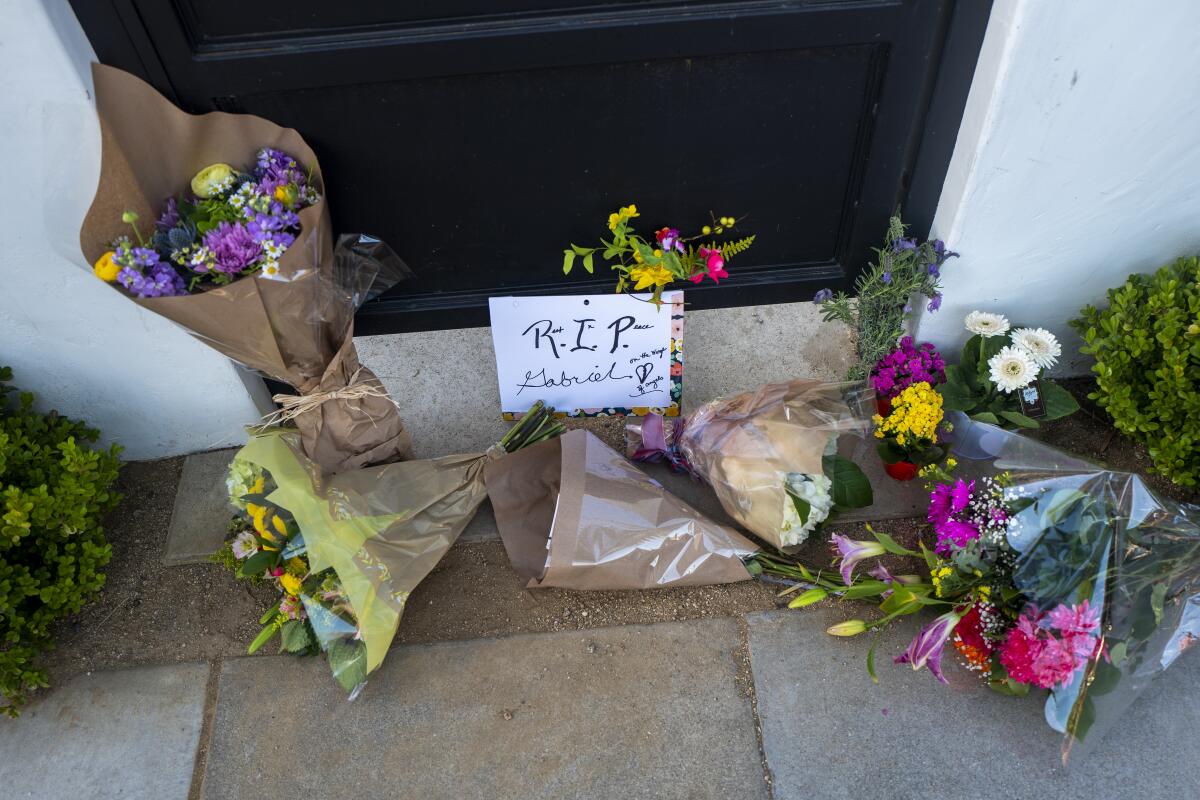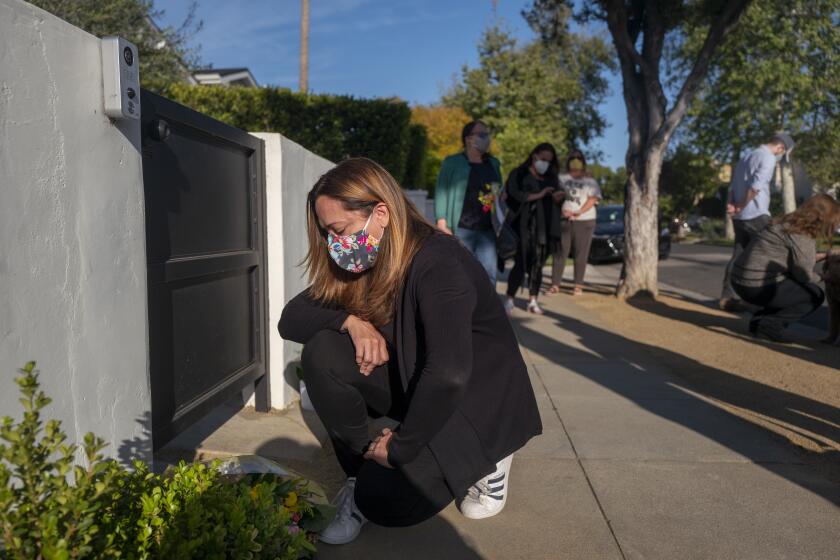Parents of Beverly Grove man killed by intruder sue LAPD over response to prior 911 calls

- Share via
The parents of a 31-year-old man fatally stabbed by an intruder at his Beverly Grove home last year have sued the Los Angeles Police Department, claiming the police mishandled multiple 911 calls about the suspect in the hours before the attack.
Gabriel “Gabe” Donnay’s neighbors had called police on the suspect, Enoch Conners, at least four times that day for hopping fences in the neighborhood and threatening residents. Officers spoke to Conners multiple times, each time letting him go and telling the neighbors that they were safe to return to their homes, according to the lawsuit.
In doing so, the LAPD “unreasonably created a false sense of security” in the neighborhood and “created an opportunity” for Conners to keep hopping fences and ultimately kill Donnay just minutes after the last 911 call, Albert Donnay and Yvonne Ottaviano alleged.
“Prior to the officers’ false reassurances, the Beverly Grove community had been vigilant in observing Mr. Conners’ movements in order to guarantee their physical safety,” the lawsuit said. “The neighborhood did not lower their alertness until officers falsely [assured] their safety and affirmatively instructed them to return to their homes.”
The wrongful-death lawsuit in federal court alleges the officers’ actions amounted to a “state created danger” that caused Donnay’s March 29, 2021, death and his parents’ “grief, emotional distress and pain and suffering.” The suit seeks unspecified monetary damages.
Capt. Kelly Muniz, an LAPD spokeswoman, said the department can’t comment on open litigation but sends its condolences to Donnay’s family. The city attorney’s office did not immediately respond to a request for comment.
The lawsuit — which was transferred to federal court from L.A. County Superior Court — is the most formal challenge yet to the LAPD’s actions leading up to Donnay’s killing. His death devastated Donnay’s family and large circle of friends, terrified and infuriated his neighbors, exacerbated tensions between local homeowners and those living in nearby homeless encampments, and raised questions for many about the way in which LAPD officers engage those who are volatile or in mental crises.
At a time of intense frustration around homelessness, Gabriel Donnay’s killing by an intruder who police say was living in his car has family, friends and neighbors saying change must come.
Police said Conners, who killed himself in an adjacent backyard after killing Donnay, was transient and living out of his car, and neighbors who interacted with him before Donnay’s killing said he was acting erratic and appeared to be experiencing a mental breakdown.
Police have previously said the officers who responded to the neighborhood that day had limited options because they had not personally witnessed Conners trespassing, didn’t have a resident willing to make a citizen’s arrest, and therefore had no grounds for detaining him.
“There’s only so much they can do,” Det. Sean Kinchla of the West Bureau homicide unit said at the time. “On one hand, you’ve got to try to help out the person making the [911] call, but on the other hand, the person that is the subject of the call also has rights.”
Donnay’s brother Theo Donnay said the family filed its lawsuit in part to challenge that notion, and to force change in how police respond in such situations — hopefully preventing similar attacks in the future.
“When I called the LAPD detective days after this incident, we had talked through everything that happened, and I said, ‘What’s to stop the exact same thing from happening this afternoon to another person?’ And he said, ‘Absolutely nothing,’” he said. “That’s unacceptable.”
Albert Donnay said the lack of change in L.A. since his son’s death has been “numbing,” and he’s not sure the lawsuit will force any change either. But it’s still worth pursuing, he said.
“This is a way for families to get some justice out of a system that stole a life,” he said.
According to the lawsuit, a Beverly Grove resident made the first 911 call at 1:32 p.m., after Conners climbed over a wall into the man’s backyard and scared him, his girlfriend and his girlfriend’s mother, the lawsuit said.
The lawsuit said LAPD officers arrived half an hour later, talked to Conners and then “irresponsibly released him.”
Less than an hour later, another man with a business in the neighborhood saw Conners “disappear through a set of bushes” into the adjacent property of another homeowner, then reappear holding a large rock. That business owner made a second 911 call about Conners, the lawsuit said.
About 30 minutes later, two other residents heard Conners screaming, and one confronted him and told him to leave his property, the lawsuit said.
At 3:45 p.m., three residents saw LAPD officers talking to Conners again. An officer told one of the residents that Conners was mentally ill, that the officers would “handle it,” and that the men should go home.
The officers then released Conners for a second time, the lawsuit said.
At 4:15 p.m., another neighbor named Claudia Beaton was told by a passing Uber driver that a man was scaling walls and jumping fences, prompting her to call 911 as well, the lawsuit said.
A dispatcher told Beaton that the police couldn’t do anything unless Conners was “currently in her yard,” then transferred her to a nonemergency line, the lawsuit said.
Soon after, Conners did enter Beaton’s yard, and she and her husband yelled loudly at him to leave while trying to warn other neighbors, the lawsuit said.
About 4:35 p.m., LAPD officers arrived in the neighborhood a third time and “conducted a brief and superficial search” for Conners before telling Beaton the area was secure and leaving again, the lawsuit said.
About five minutes later, Conners entered Donnay’s home, the lawsuit said. Donnay came upon him “unhinged” in a bedroom, at which point Conners attacked Donnay with a knife as Donnay tried to escape from the home, the lawsuit said.
Donnay’s roommate heard the struggle, saw “a blood trail down the stairs, through a hallway and outside,” then saw Conners stabbing Donnay repeatedly in the backyard before he screamed and Conners leaped over a fence into another yard, the lawsuit said.
The roommate “cradled Mr. Donnay as he died from his wounds,” the lawsuit said.
Donnay suffered 10 stab wounds and more than 20 other cuts to his body, the lawsuit said.
Danielle Peters, a neighbor who grew up in Beverly Grove and still lives there, said the lawsuit’s description of police failing to act was “100% spot on,” and she’s glad the family is suing.
Encampments in the area have grown out of control, people in crises wander the streets at all hours, residents are being assaulted, robbed and burglarized, and police and local officials act like there is nothing they can do about it, Peters said.
She said a law is needed “to stop someone when they are acting like that and to detain them to see if they are mentally stable enough to be released.”
Peters said she was recently driving through the neighborhood when she saw a man in the street who was screaming, smashing things and ripping his clothes off, and who seemed to her like he might hurt someone.
She fears an attack similar to the one on Donnay could happen again.
“There’s just nothing in place that would prevent exactly the same scenario again,” she said, “except for maybe neighbors who take matters into their own hands.”
More to Read
Sign up for Essential California
The most important California stories and recommendations in your inbox every morning.
You may occasionally receive promotional content from the Los Angeles Times.














